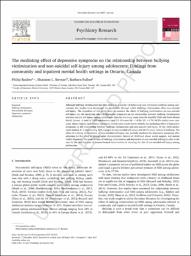| dc.contributor.author | Baiden, Philip | |
| dc.contributor.author | Stewart, Shannon L. | |
| dc.contributor.author | Fallon, Barbara | |
| dc.date.accessioned | 2018-01-09T01:48:12Z | |
| dc.date.available | 2018-01-09T01:48:12Z | |
| dc.date.issued | 2016 | |
| dc.identifier.citation | Published in Psychiatry Research 255, 238-247, 2017 | en_US |
| dc.identifier.issn | 0165-1781 | |
| dc.identifier.uri | http://hdl.handle.net/10106/27100 | |
| dc.description.abstract | Although bullying victimization has been linked to a number of behavioral and emotional problems among adolescents, few studies have investigate the mechanism through which bullying victimization affect non-suicidal
self-injury. The objectives of this study were to examine the effect of bullying victimization on non-suicidal
self-injury and the mediating effect of depressive symptoms on the relationship between bullying victimization
and non-suicidal self-injury among adolescents. Data for this study came from the interRAI Child and Youth Mental
Health dataset. A total of 1650 adolescents aged 12–18 years (M =14.56; SD =1.79; 54.2% males) were analyzed.
Binary logistic and Poisson regression models were conducted to identify the mediating effect of depressive
symptoms on the relationship between bullying victimization and non-suicidal self-injury. Of the 1650 adolescents
studied, 611 representing 37% engaged in non-suicidal self-injury and 26.7% were victims of bullying. The
effect of bullying victimization on non-suicidal self-injury was partially mediated by depressive symptoms after
adjusting for the effect of demographic characteristics, history of childhood abuse, social support, and mental
health diagnoses. The contribution of bullying victimization and depression to non-suicidal self-injury adds to the
case for the development of trauma-focused interventions in reducing the risk of non-suicidal self-injury among
adolescents. | en_US |
| dc.description.sponsorship | This research was supported in part by Joseph-Armand Bombardier Canada Graduate Scholarship-Doctoral Award through Social Sciences and Humanities Research Council (SSHRC) of Canada awarded to the first author. This research was also supported by the Community Vitality Grant through the London Community Foundation. Special thanks to the children, youth, and families for their time and effort. | en_US |
| dc.language.iso | en_US | en_US |
| dc.publisher | Elsevier | en_US |
| dc.subject | interRAI Child and Youth Mental Health dataset | en_US |
| dc.subject | Bullying victimization -- Adolescents | en_US |
| dc.subject | Non-suicidal self-injury -- Adolescents | en_US |
| dc.subject | Depressive symptoms | en_US |
| dc.title | The mediating effect of depressive symptoms on the relationship between bullying victimization and non-suicidal self-injury among adolescents: Findings from community and inpatient mental health settings in Ontario, Canada | en_US |
| dc.type | Article | en_US |
| dc.description.version | Uncorrected proof | en_US |
| dc.publisher.department | School of Social Work, The University of Texas at Arlington | en_US |
| dc.identifier.externalLinkDescription | The original publication is available at Article DOI | en_US |
| dc.identifier.doi | http://dx.doi.org/10.1016/j.psychres.2017.05.018 | |

